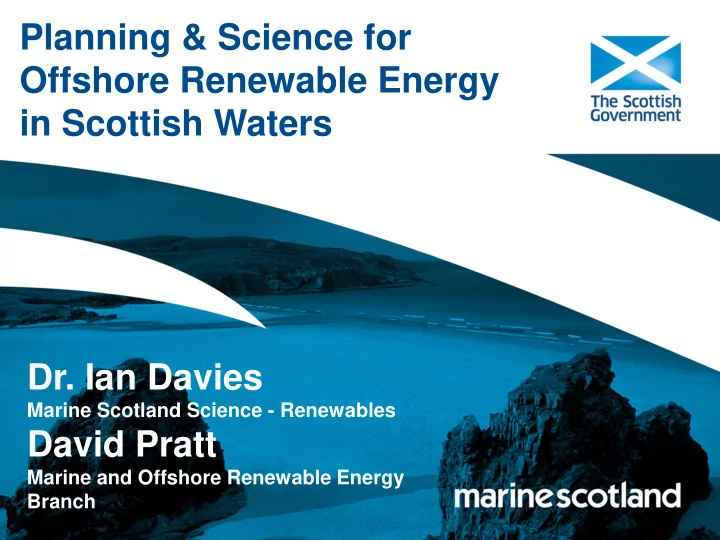

Planning & Science for Offshore Renewable Energy in Scottish Waters Dr. Ian Davies Marine Scotland Science - Renewables David Pratt Marine and Offshore Renewable Energy Branch
Marine Scotland and The Crown Estate Marine Planning Seabed Leasing and Licensing Agency Authority
Blues Seas Green Energy (BSGE) Plan for Offshore Wind Energy - 2011 Projects at Licensing Stage - Islay - Inch Cape - Neart na Gaoithe - Forth Array - Beatrice 25 Medium-Term Areas of Search – starting point for current Sectoral Plan development process In addition to BSGE: - 2 Round 3 Zones - Seagreen - MORL
Sectoral Marine Planning Process Identify / Refine Search Areas Consultation Refine Areas Assess Areas Statutory Consultation Finalise Areas Adopt Areas
Stage 1: Scoping studies Scoping Studies for marine renewable energy using TCE MaRS modelling. A) Identify broad availability of resource (wind, wave, tidal stream and technical constraints (e.g. distance from shore)
Wave energy resource
Scoping Studies for marine renewable energy using TCE MaRS modelling. B) Identified constraints that make consenting more difficult. Grouped them as: Environmental factors Industrial factors Socio-cultural (heritage) factors
Layers included into each theme Environmental Theme Industrial Theme Socio-cultural theme
Constraints - shipping Shipping Density - Predicted Ships Per Year 0 366 - 730 (1 - 2 per Day) 1 - 12 (<1 per Month) 731 - 1,825 (2 - 5 per Day) 13 - 52 (<1 per Week) 1,826 - 3,650 (5 - 10 per Day) 53 - 104 (1 - 2 per Week) 3,651 - 7,300 (10 - 20 per Day) 105 - 208 (2 - 4 per Week) 7,301 - 10,950 (20 - 30 per Day) 209 - 365 (4 - 7 per Week) 10,951 - 23,599 (>30 per Day) Rank Shipping (predicted ships Weighting W * S Scor Range per year) e 0 - 93 90 1 - 12 2 180 93 - 311 90 12 - 52 3 270 311 - 687 90 52 - 104 5 450 687 - 1278 90 104 - 208 7 630 1278 - 2174 90 208 - 300 8 720 2174 - 3304 90 300 - 365 10 900 3304 - 4606 90 365 - 500 11 990 4606 - 6612 90 500 - 730 13 1170 730 - 6612 - 11183 90 15 1350 23599 730 - 11183 - 23600 90 16 1440 23599 Harbour Admin All 100 10 1000 Area Features
Weighting of conservation designations Weighting Data layer RAMSAR sites H Special Areas of Conservation H Special Protection Areas H Offshore candidate, draft or possible H SACs and SPAs Sites of Special Scientific Interest H/M Possible sea haul out sites M/H Bird reserves M Local nature reserves M Important Bird Areas L
Offshore wind: Industry model
Offshore wind: Environment model
Offshore wind: Equal weighting combined model
Early stage consultation • Scoping exercises undertaken in late 2011 – early 2012 • Pre-statutory consultation – August 2012 OFFSHORE TIDAL WAVE WIND
Developing the Draft Sectoral Plans • Draft ‘Plan Options’ identified • Draft Plan Options subject to sustainability appraisal: – Strategic Environmental Assessment – Habitats Regulations Appraisal – Socio-economic Impact Assessment • The assessment findings contained the Draft Plans
Draft Sectoral Marine Plans – Wind, Wave & Tidal Options - 2013
Plan Implementation - Review • Target date for adoption – July 2014 – Issues - Leasing – EMR – NMP Adoption • Post-Adoption Statement – Key outcomes of SEA, HRA, Socio-economics • Review Period to be determined – Current Plan reviewed over 2 year period • Strategic Grid Plan – DPO rationalisation • Strategic Monitoring & Research – Addressing data baseline data-gaps – Learning lessons from Project Licence Applications
DATA QUALITY !
Wave energy resource
Tidal stream energy resource (>1.5 m/s mean spring peak current)
Field survey work • Bathymetry and backscatter obtained using a multibeam echosounder system (dual frequency Reson 7125 system) • Videos and photographs obtained by towing a dropframe TV and stills camera behind the vessel
Bathymetry
Windfarm risk to seabirds – ESAS/ McArthur Green
Swimming depths of returning Atlantic salmon in coastal waters
Moray Firth Inshore fisheries Landings, as value per km 2
• Consultations in progress • Final outputs expected Sept 2013
‘Cultural heritage’ • World Heritage Sites • Scheduled Ancient Monuments • Wrecks • Marine archaeology potential – Land 10,000 years ago – + Soft sediments that might preserve remains
Aesthetic values - Landscape • Regions of coast have different sensitivity to landscape impacts - National Scenic Areas - Local Landscape designations - Other coastline - Heritage areas (WHS, SAM)
Mapping Recreational Use of Scotland’s Seas Current Access / ‘Recreational’ Usage Population distribution / ES Knowledge Potential usage
Surfing and Windsurfing • 53,000 surfers and 24,000 windsurfers in 2008 • Remote locations sought out (Lazorow, 2008) • Expenditure estimates £16.4 M annually
Surfing and Windsurfing
Other recreational use • Wildlife watching – Expenditure £160 M, Income £92 M – 224,000 cetacean watchers: 27% of European total a doubling in the last decade (IFAW 2009)
Questions? • Further Information - • Offshore Renewable Energy Planning Webpage • http://www.scotland.gov.uk/Topics/marine/ma rineenergy/Planning • Offshore Renewable Energy Planning Mailbox • offshorerenewableenergy@scotland.gsi.gov.uk
Recommend
More recommend